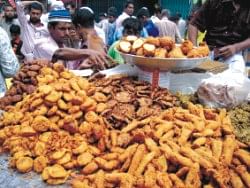|
Postscript
Mixed Blessing
Aasha Mehreen Amin
 |
Photo: Zahedul I Khan |
It is Ramadan again and most Bangladeshis – the fasters and the non-fasters, look forward to the festive atmosphere that this month brings to our lives. It is also that wonderful sense of camaraderie amongst people when they pray together and share their food, even with total strangers. It is also a time when culinary expertise reaches its zenith and innovative iftari options come to the fore. Have you tried the two-minute egg noodle boras and mushroom jilapis yet?
There are also things you wouldn't look forward to during this month when one is supposed to abstain from all things unsavoury. Walking on the streets for instance is filled with hidden dangers and we're not talking about the sudden pothole or open manhole. During this holy month, many overzealous fasters make the streets unholy with oceans of saliva. If you thought the usual spitting frenzy to be a disturbing part of city life, just wait till Ramadan when spitting is taken to the level of a national sport. It is here a spit, there a spit, everywhere a spit spit.
Why aren't these people given a show cause notice asking why they should not be punished for soiling the already soiled streets during such a spiritual month? There is little point in explaining to these fanatical spitters that the salivary glands are programmed (by the Almighty) to produce saliva so as to ensure the health of the mouth and throat. Why every drop has to be eliminated before breaking the fast is really a mystery, especially since it is humanly not possible to spit out every bit of saliva that we produce. The only possible solution is to fine people who randomly spit on the street, who seriously jeopardise the pedestrian who may find it impossible to dodge the shooting missiles and puddles on the road.
But enough of this gross subject. Let's talk iftar, the most anticipated part of fasting. After a whole day of fasting, most people want to break their fasts with something tasty and nutritious. Unfortunately, these days the two concepts are mutually exclusive. The tastier the iftari, the less likely that it will do anything to improve one's health. The bora and beguni may titillate your taste buds but they may also create a cyclone in your stomach. I don't know, maybe it's the diesel in the oil, the clothing dye in the food colours, the carcinogenic, acid-forming and kidney-destroying spices.
The wise ones (a dwindling minority) will exercise extreme self-control, in keeping with the general ambience of this month, and completely avoid the bhaja and pora (fried and burnt) delicacies and opt for healthier diets – fruit, cheera-doi, rice, fish and vegetables. The only concern is whether these so-called health foods are any better than the unhealthy ones. How can we be sure, for instance, about the accepted level of ammonia in the cheera and muri, the melamine in the curd, the formalin in the fish and the pesticides in the veggies and fruits? Note: The word 'accepted levels' here means the amount of unholy substances we wary citizens have reconciled to consume as being residents of this mega polis.
Which leaves us with little more than a sliver of hope that our caring government will at least show that they are trying to address the problem of soaring prices and adulterated food during this month when people attempt to cleanse their body and spirit and become better human beings. It also means that even if it's the diesel-soaked bora and ammonia-dipped muri we are having, we will share it with our fellow-beings and experience this rare moment of fellow feeling that seems to come naturally during this month.
Copyright
(R) thedailystar.net 2010
|

